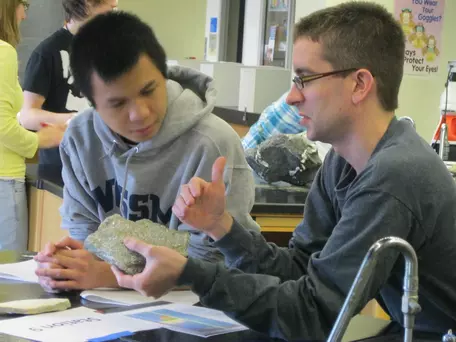Working with Adjuncts

This page was written by Anne Egger (Central Washington University) and Molly Kent (Science Education Resource Center, Carleton College), drawing on discussions and contributions from the 2014 Getting the Most Out of your Introductory Courses workshop.
According to the Institute of Education Sciences (IES ), many institutions of all sizes are hiring more adjunct and temporary faculty than ever before. Ensuring that these individuals can hit the ground running presents a unique challenge, both to departments and to the incoming adjuncts. Participants in the 2014 Getting the Most out of Your Intro Courses workshop contributed the following ideas and suggestions for effectively launching new adjunct faculty.
Hold an Orientation
An all-adjunct orientation or meeting at the beginning of the year is a great opportunity for new faculty to network with one another and meet their course coordinator and department chair. Or, consider requiring all faculty to attend the meeting - such an event can help adjuncts find a mentor in the department, and it provides an informal setting for getting advice and tips.
Another option is to extend the orientation and turn it into a workshop. The Traveling Workshops Program, run by the National Association of Geoscience Teachers (NAGT), can be tailored to address a number of topics at the course or department level.
Develop an Adjunct's Handbook
A handbook that compiles institutional and departmental expectations is an invaluable tool for faculty who are trying to get oriented in a new position. Consider including:
- formal policies at the institution and department levels
- instructions for the Learning Management System and other online tools
- contact information for the HR office
- any other offices that would be useful
- informal advice
- ideas for getting involved in the local community
Provide Course Materials
While providing a syllabus seems obvious, there are other factors to consider. If the syllabus is already set and must be taught as-is, it may be helpful to provide teaching notes, past exams, activity materials, lab materials and tips for success. If the syllabus is simply a guideline and can be adjusted, consider providing multiple examples of how other faculty have taught the course in the past. Whatever the case, the more information and support you can provide, the more successful your adjunct will be.
In addition to providing documents and files, consider giving adjuncts the opportunity to swap lectures with another faculty member, especially if they are teaching outside their area of expertise. Trading lectures gives all faculty involved a chance to teach their specialty and exposes students to multiple viewpoints. It can also strengthen the department by creating a sense of community.

Consider Course Context
If a department has upper-level courses, its introductory-level courses are likely to be more structured and aimed at launching students into the Geology major. In such a department, it is vital to include adjuncts in any coordinating discussions and plans across course sections. Remember, adjuncts will not be familiar with the institution's jargon, and may even appreciate an in-person tour of classrooms and laboratories.
If your program does not have upper-level classes, consider giving your adjuncts more freedom over their course content and structure. Increased ownership of a course can lead to increased investment and improved curriculum. The same advice applies to adjuncts who have been hired long-term, or who will be teaching the same course more than once.
Provide Evaluation Opportunities
Evaluation by students is a very common practice, but evaluation by other faculty is sometimes overlooked. Provide adjuncts with opportunities to observe other faculty, and return the favor by observing them. This could be as simple as having another faculty member sit in and give verbal feedback, or it could be formalized with a rubric and a written report; either way, combining constructive student and faculty feedback is an effective way to help new and adjunct faculty improve their teaching.

